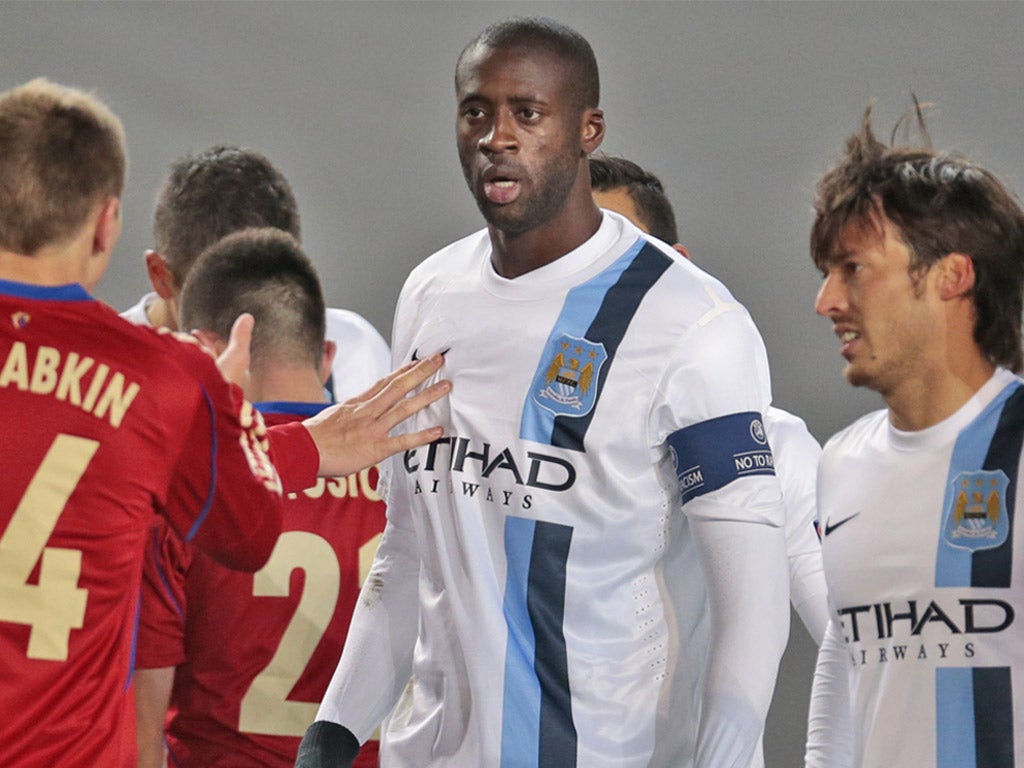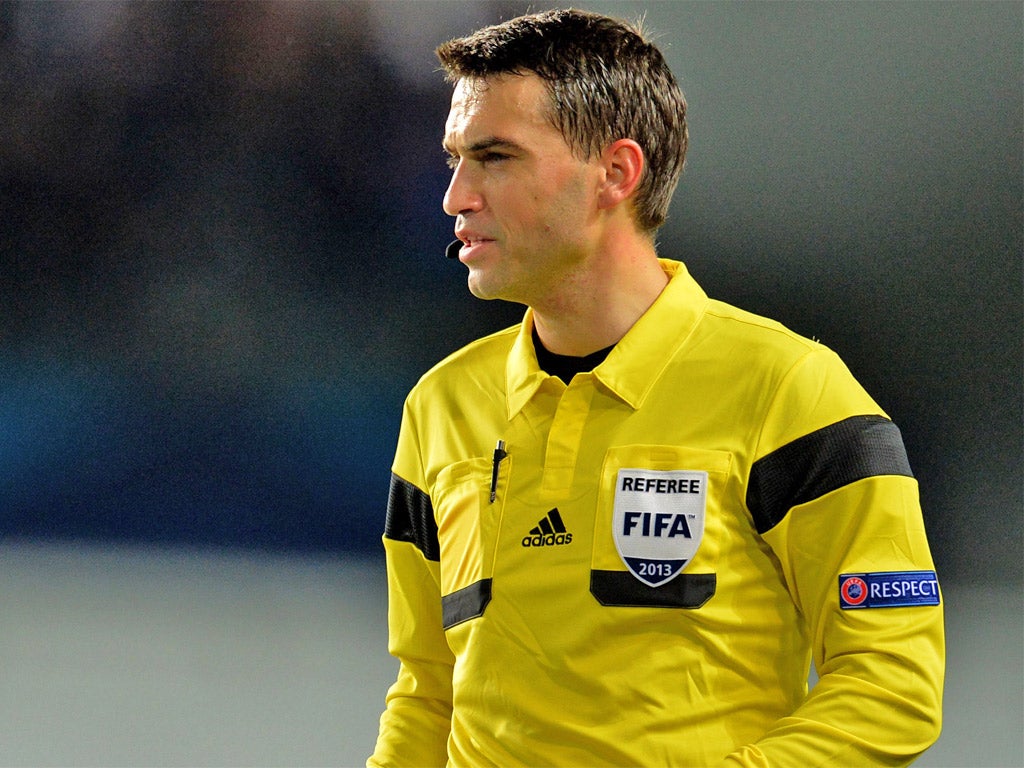Yaya Touré's Ivory Coast team-mate says he is 'exaggerating' over racist chants
CSKA Moscow's Seydou Doumbia points finger at City man over abuse but Uefa to investigate

Your support helps us to tell the story
From reproductive rights to climate change to Big Tech, The Independent is on the ground when the story is developing. Whether it's investigating the financials of Elon Musk's pro-Trump PAC or producing our latest documentary, 'The A Word', which shines a light on the American women fighting for reproductive rights, we know how important it is to parse out the facts from the messaging.
At such a critical moment in US history, we need reporters on the ground. Your donation allows us to keep sending journalists to speak to both sides of the story.
The Independent is trusted by Americans across the entire political spectrum. And unlike many other quality news outlets, we choose not to lock Americans out of our reporting and analysis with paywalls. We believe quality journalism should be available to everyone, paid for by those who can afford it.
Your support makes all the difference.Yaya Touré's Ivory Coast team-mate Seydou Doumbia has accused the Manchester City player of “clearly exaggerating” his claims of the racist abuse he suffered at CSKA Moscow on Wednesday, as pressure increased on the Romanian referee, Ovidiu Hategan, for failing to stop the match.
Touré was subjected to racist abuse from CSKA Moscow fans during City's 2-1 win in the Champions League, which he informed the referee about, but CSKA asserted that their supporters had done nothing wrong. Doumbia, who played up front for CSKA, was the most surprisingly assertive, almost accusing Touré of making up his complaints.
"I didn't hear anything like that from the CSKA fans," said Doumbia, who has 20 caps for Ivory Coast and played with Touré for the national side this summer. "Yes, they are always noisy in supporting the team, and try to put as much pressure as possible on our opponents, but they wouldn't ever allow themselves to come out with racist chants. So my Ivory Coast colleague is clearly exaggerating."
Doumbia's reaction was just as unsympathetic as the rest of CSKA. A club statement said they were "surprised and disappointed" by the words of Touré and others connected with Manchester City, and that there was no case to answer.
"In many episodes of the encounter, especially with the attacks on our goal, fans made disapproving noises, booed and whistled to put pressure on the opposite side's players regardless of their race," the statement read. "In particular, this happened in the moments with Alvaro Negredo and Edin Dzeko. It is not clear, why Touré took it all personally."
Uefa, though, have opened disciplinary proceedings against CSKA Moscow for racist behaviour of their fans and for setting off fireworks. The case will be dealt with by the Uefa Control and Disciplinary Body on 30 October.
There was increased pressure on Uefa – from Kick It Out and the Professional Footballers' Association – over the conduct of the referee Hategan, who should, under guidelines from Uefa, have spoken to officials when the racial abuse was reported to him. Lord Ouseley, the head of Kick It Out, demanded that Hategan be banned. "He failed to do his duty last night and that is a clear issue that Uefa should be dealing with," he told the BBC.
Bobby Barnes, deputy chief executive of the PFA, said that Touré could have expected Hategan to stop the game. "The player, having done what was asked of him to notify the referee, quite rightly expected that the referee would go speak with the safety officer, and the [Uefa] protocol agreed is that the safety officer should make a stadium announcement warning the fans that if the chants do not desist that the game will be stopped."

The criticism of Hategan is due to his failure to enforce the three-point protocol agreed between Uefa, Fifpro – the Professional Footballers' Union – and the European Clubs Association. Those three organisations, through the Professional Football Strategy Council (PFSC), reaffirmed in March their commitment to Uefa's guidelines.
If the referee becomes aware of clear racism he shall "stop the game and ask for an announcement to be made over the public address system requesting the public to immediately stop such racist behaviour". If the racism continues, the referee "shall suspend the match for a reasonable period of time" and send the teams back into the dressing rooms. The referee can abandon the match as a last resort.
On Wednesday night Hategan did no such thing, failing to act on Touré's information. Fifpro is trying to find out why. A Fifpro spokesman told The Independent that they want to know why Uefa did not "stick to what they promised. We want to get to the bottom of this and will look closely in the coming days".
Barnes, who is also Fifpro division Europe president, said that he hoped Uefa would send a message. "I would certainly hope in line with the hardline stance that Uefa has stated and intends to use in these circumstances, they will make a meaningful sanction in this case."
Russian news agency RIA Novosti has reported Touré also raised the spectre that black players could boycott the 2018 World Cup if there is any repeat. "If we aren't confident at the World Cup, coming to Russia, we don't come," he was quoted as saying. That stance was supported by Piara Powar, executive director of European anti-discrimination body FARE and a FIFA task force member. "I wouldn't blame them – if all the players said they are not going, there wouldn't be a World Cup," he said.
Hughton 'sad and angry' about abuse
The Norwich City manager Chris Hughton is “disappointed, sad and angry” that he and others still have to face up to racism in the modern game and believes tougher punishments are needed.
Hughton was the target of online abuse for the second time this season on Facebook, which police are currently investigating.
Hughton said: “Regards my own situation I am disappointed, sad and angry, it is all of those emotions. It is in the hands of the appropriate authorities and I am quite sure the correct action will be taken.”
Hughton believes the football authorities should take stronger action to deter such instances, particularly within the wider European game. “Most of the penalties these days seem to be fines. Fines are easily paid by the bigger clubs. Do we need harsher penalties? Yes, we do, absolutely.”
John Nesbit
Join our commenting forum
Join thought-provoking conversations, follow other Independent readers and see their replies
0Comments